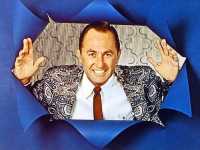There’s two Lenny Dees. One is the fifties organ player who had a #1 hit with Plantation Boogie in 1955. The other is a New York DJ. You can find out more about the organ player here and here.
Lenny Dee
Born Leonard George DeStoppelaire, 5 January 1923, Chicago, Illinois Died 12 February 2006, Saint Petersburg, Florida
Dee master of dee organ who made dee most of his dee-stinctive name. The youngest of eleven children, he was born in Chicago, where his father ran a tavern near Logan Square, but the family moved to Florida when he was a child, and Florida remained his home for most of his life. He began studying music in his early teens, taking accordion lessons. He was good enough to be working as a professional before he was drafted in 1943.
Dee put most of his savings from his Navy pay into buying a Hammond Model A organ, one of the first commercially-available electronic organs in the U.S. He returned to music, this time as an organist, but had only moderate success until the early 1950s, when country singer Red Foley heard him and convinced his label, Decca, to hire Dee as a corn-fed alternative to the lively Ethel Smith. Dee’s biggest hit, “Plantation Boogie,” came early in his career and was covered by dozens of other artists. Dee himself admitted that the tune was based on a riff from Pine Top Smith’s “Pinetop’s Boogie Woogie.”
Although he never charted again, Decca kept him on contract for over 20 years. He recorded steadily, cutting two to four albums a year for Decca and its successor MCA, until MCA axed most of its easy-listening roster of artists in the early 1970s. While his later albums are strongly influenced by the “countrypolitan” Nashville sound, his early albums are marked by a charming goofiness, as shown by the litany of punning titles.
In the early 1950s, Dee built a home in Sarasota, Florida, and Florida became his base from then on. Dee gave acting a brief and forgettable try in the 1974 movie, Ride in a Pink Car, starring Glen Corbett and filmed near Palmetto, Florida. Dee’s character arrives in the pink car of the title, dressed entirely in pink — probably the only memorable thing about the whole made-for-drive-in movie. His most famous album cover was also set in Florida. It showed Dee, seated at his Hammond, cruising through Cypress Gardens alongside one of the stunt water-skiers from that resort’s famous shows.
His first love, though, was performing before live audiences, principally in night clubs along Florida’s Pinellas coast. In the early 1960s, he moved to St. Peterburg Beach, where he invested in a beachside motel with its own nightclub. It was the first of a string of local venues he put his name to, including Lenny Dee’s Den and Lenny Dee’s Kings Inn. He appeared at one or another of these spots at least several times a week for a period of over 30 years.
In a way, he outlasted his fans: “My fans don’t come out to nightclubs anymore,” he told a reporter in the late 1990s. “They’re afraid to drive at night. And they don’t drink like they used to, so they can’t support the kind of clubs I love.” He eventually put up his Hammond B3000 for sale in a local want ad and went into retirement, although he still performed once in a while, at the demand of aging fans or a new generation of Space Age Pop listeners, until he succumbed to a terminal illness.
Dj Lenny Dee: Lenny Dee is a native of New York. He started his career in 1984 DJing in a local roller disco in Brooklyn NYC at the age of 17. Lenny Dee is recognized as one of New York’s earliest Techno pioneers. His earlier music consisted of Disco, Electro-Body, High Energy and early House. In 1989, Lenny’s musical exploits brought him to Europe, which changed his direction once again. Lenny Dee’s DJing career propelled him to be one of the most sort after international Techno DJs in the world. In a time where DJs remained local for the most part, he became the number one international DJ in Germany, Scotland, France and Switzerland with his new sound - Hardcore Techno - a sound that he is still known for today. Lenny launched Industrial Strength Records in the U.S.A. in 1991 with PCP’s ‘Mescalinium United’, becoming the first Hardcore Techno label in the world and one of the first Electronic Labels in the U.S.A. On a personal front Lenny’s productions have always been diverse from his signature hardcore, to techno, house and beyond.
